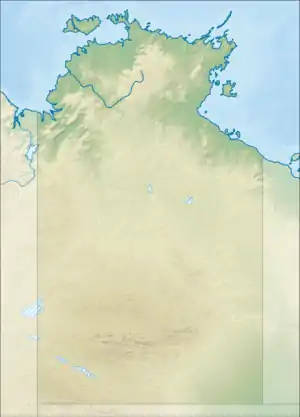Buckingham River
Buckingham River is a river in the Northern Territory of Australia.
| Buckingham | |
|---|---|
 Location of the Buckingham River mouth in the Northern Territory | |
| Location | |
| Country | Australia |
| Territory | Northern Territory |
| Physical characteristics | |
| Source | Mitchell Ranges |
| • location | Arnhem Land, Australia |
| • elevation | 75 m (246 ft) |
| Mouth | Buckingham Bay |
• location | Australia |
• coordinates | 12°19′41″S 135°43′46″E |
• elevation | 0 m (0 ft) |
| Length | 59 km (37 mi) |
| Basin size | 7,510 km2 (2,900 sq mi) |
| Discharge | |
| • average | 73.8 m3/s (2,610 cu ft/s) |
| [1] | |
The headwaters of the river are on the northern edge on the eastern side of the Mitchell Ranges near where the Central Arnhem Road crosses the Range. The river flows in a northerly direction though uninhabited country until it discharges into Buckingham Bay and the Arafura Sea.
The estuary formed at the river mouth is tidal in nature and in near pristine condition.[2]
The catchment area of the river is 7,510 square kilometres (2,900 sq mi) and has an annual average discharge of 2,330 gigalitres (3.047524943×109 cu yd).[3]
The traditional owners of the area are the Murngin also known as the Yolngu peoples.[4] The Aboriginal community of Gapuwiyak still has supplies taken by barge up the river to be delivered. The community is 20 kilometres (12 mi) by road from the landing.[5]
References
- "Map of Buckingham River, NT". Bonzle Digital Atlas of Australia. Retrieved 17 May 2015.
- "Australian Catchment, River and Estuary Assessment" (PDF). Natural Heritage Trust. 2002. Archived from the original (PDF) on 13 February 2014. Retrieved 2 May 2015.
- Christine Bach and Jane Hosking (1 September 2002). "Wetland monitoring for the Mary River Catchment, Northern Territory" (PDF). Natural Heritage Trust. Retrieved 27 April 2015.
- "Murngin". AusAnthrop Australian Aboriginal tribal database. Ausanthrop. Archived from the original on 5 May 2015. Retrieved 4 May 2015.
- "Gapuwiyak Community". Arnhem Land Progress Aboriginal Community. 2015. Archived from the original on 27 November 2020. Retrieved 27 April 2015.